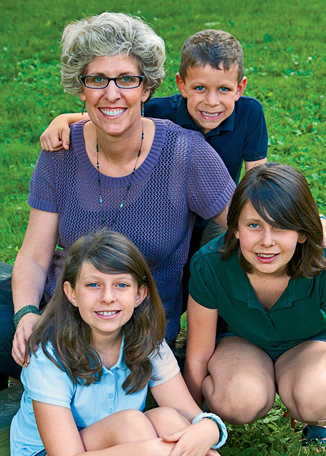
For families of children with special education needs, life isn’t always easy.
But when parents in the New York area need assistance in handling their children’s education, help comes in the form of Patricia Phelan, JD ’89.
Phelan, who once worked as a state prosecutor in New York and as a senior assistant district attorney, now runs her own practice specializing in special-education law. She works to ensure that families with special-needs children know what education services they’re entitled to receive from public schools.
While Phelan has worked in other areas of law, they fell by the wayside when one of her daughters was diagnosed with Pervasive Development Disorder-Not Otherwise Specified (PDD-NOS), a disorder on the autism spectrum.
When her daughter started school, Phelan needed to advocate for her to get the school to provide adequate services.
“I gave her a voice when she didn’t have one,” Phelan says. “My husband and I did not want to leave any stone unturned. We pursued help for her, and we continue to do so. Fortunately for us, she’s doing relatively well. She’s a very strong girl.”
Through her experience of advocating for her daughter, Phelan realized it was a difficult process. She felt she could use both her skills as a lawyer and the lessons she learned with her daughter to help other families undergoing similar experiences.
“My original motivation came from going through the process of needing help myself,” she says. “I had a difficult time finding an attorney who could represent me and my family the way we felt we needed to be represented.”
“Often, parents need someone to help them communicate more effectively with their school district,” Phelan says. “When you’re talking about your own child, it’s hard not to be emotional, and sometimes it helps to have an independent person advocating on your behalf.”
Phelan now helps parents learn about the rights of their special-needs children, advocates for the children and parents to schools, and on occasion goes to court for them.
“Often, parents need someone to help them communicate more effectively with their school district,” Phelan says. “When you’re talking about your own child, it’s hard not to be emotional, and sometimes it helps to have an independent person advocating on your behalf.”
Phelan says the single most important thing for parents to do is understand where the school is coming from.
“Sometimes that’s hard because you feel that you’re right and they’re wrong,” she says. “You want to prove you’re right. But if you go in there and just fight, no one wins. You really have to advocate. It’s OK to be resilient, but it’s important to keep a collaborative tone.”
Although Phelan didn’t plan to focus on special-education law, she parlayed her past experience to become an effective advocate.
“Both (being a prosecutor and a special-education lawyer) are very rewarding fields and you feel as if you’re helping someone who needs your help, but substantively they’re different,” Phelan says. “Special-education law is a hard area of law, and the law itself doesn’t give the parents everything they want for their child or what’s best for the child. That’s a difficult thing for parents to accept and learn to live with.”
One of the difficulties that parents experience is that the schools have more money than the families, so it’s hard for families to fight for their children’s rights.
“Ideally, the situation would be more equitable than it is,” Phelan says. “It wouldn’t require parents to have to hire a lawyer at all to understand their rights or pursue their rights.”
One difference between her current job and her old ones is that in special-education law, disputes do not immediately go to court. First, they are litigated at a hearing in front of an impartial hearing officer (IHO). If there is an appeal from the IHO, then the case is heard by the state review officer (SRO). Only if there is an appeal from the SRO does the dispute go to court.
Just last year, Phelan became one of those impartial hearing officers.
“It was very exciting to be selected, and I think it will give me an opportunity to really make a difference in children’s lives,” she says.
Phelan lives in New York with her husband and her three children, Kaitlin, 12, Ashley, 10, and Michael, 6.
For more information, visit www.phelanspecialedlaw.com.
Michelle Merlin, Arts & Sciences Class of ’12, was a summer writing intern in University Marketing & Design.
Comments and respectful dialogue are encouraged, but content will be moderated. Please, no personal attacks, obscenity or profanity, selling of commercial products, or endorsements of political candidates or positions. We reserve the right to remove any inappropriate comments. We also cannot address individual medical concerns or provide medical advice in this forum.